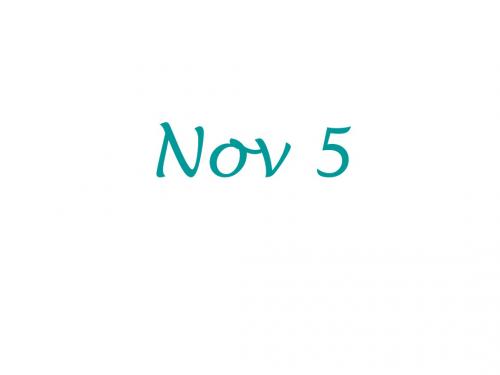Must的反意疑问句
- 格式:ppt
- 大小:17.00 KB
- 文档页数:4

巧解must的反意疑问句must + be/do可以表示对目前情况的肯定推断,如: He must be a teacher. 他一定是一位老师。
must + have done可以表示对过去情况的推测,如:You must have waited for a long time.你一定已经等了很长时间了。
那么它们的反意疑问句是什么呢?很多同学想当然地写成mustn’t he/you.,这是完全错误的。
当must表推测时,其反意疑问句随时间和人称而变化。
正确的答案应该分别是isn’t he和 haven’t you。
那么如何才能快速准确地做出判断呢?根据笔者多年的教学经验,利用还原法解决这一问题较好。
所谓还原法,就是先把句子还原成一个不带must 推测意味的句子。
如He must be a teacher.可还原为He is a teacher.其反意疑问句为isn’t he? 也就是原句的正确答案。
同样方法You must have waited for a long time.可还原为 You have waited for a long time.其反意疑问句haven’t you?即原句的答案。
注意:1、在must 表示现在情况的推测时,要注意主语对还原后句子谓语动词的影响。
如:1.He must be ill at home, isn’t he?(还原为He is ill at home.)2.They must be ill at home, aren’t they?(还原为They are ill at home.)2、must 表示对过去的情况推测时,要注意句意和时间状语对还原后句子时态的影响。
如含有 for a long time, so far, before, since 等时间状语的句子还原后句子为完成时;而含有last night, yesterday, the other day, ten years ago 等时间状语的句子则还原为过去时。

must反义疑问句用法1. You say you must go, don't you? Like when your mom says "You must finish your homework before playing games", and you're like "But mom, can't I do it later?"2. They think they must follow the rules, don't they? It's just like in a football game, the referee says you mustn't use your hands, and the players have to abide by it.3. He says he must be on time, doesn't he? Kind of like when you tell your friend "You must meet me at five o'clock sharp!"4. She insists she must have that dress, doesn't she? Just like when Cinderella insists she must go to the ball and find her prince.5. We know we must work hard, don't we? As if we are climbing a mountain and we must keep going up.6. They claim they must win the competition, don't they? It's like a race where everyone thinks they must cross the finish line first.My view is that understanding and using the "must" interrogative sentence skillfully can make our language more vivid and interesting.。

当陈述句中含must的时如何变反意疑句
说明:引用此文请注明出处,并务请保留后面的有效链接地址,谢谢!Article/201008/1654.html
当陈述句中含must的时如何变反意疑句
陈述句部分含有表示“禁止”的mustn’t 时,简略问句部分用must;含表示“必须,必要”的must 时,简略问句用needn’t;所含must 表示推测“想必,一定”时,若对现在的推测,must be 后,用isn’t 或aren’t,must do 后,用don’t 或doesn’t,若是对过去的推测,“must have+过去分词”后,一般用haven’t 或hasn’t,但当有 yesterday, last night 之类的表示明确过去时间的状语时,就用didn’t。
如:
You mustn’t walk on grass, must you? 你不得在草地上行走,好吗?
You must go home right now, needn’t you? 你必须马上回家,对不对?
He must be mad, isn’t he? 他一定是疯了,是不是?
You must be tired, aren’t you? 你一定累了,对不对?
He must know her, doesn’t he? 他一定认识她,是吗?
You must have read it, haven’t you? 你一定读过它,是吗?
You must have seen t hat film last year, didn’t you? 去年你一定看过那部电影,是不是?。

含有must时,反义疑问句的归纳
答:当陈述句部分有情态动词must时,反意疑问部分有四种情况:
:
①若must表示“必须”或“有必要”,疑问部分用mustn’t或needn’t
you?你必须(有必要)马上离开,是吗?
You must leave at once, mustn’t [needn’t]
但是若陈述部分有mustn’t表示禁止,疑问部分要must:
You mustn’t laugh, must you?你不准笑,知道吗?
②若must表示推测,疑问部分不能用must,而应根据must后的动词结构采用相应的动词
形式:
he?他一定累了,是吗?
He must be tired, isn’t
③当must用来表示对现在的情况进行“推测”时,反意疑问部分要根据must 后面的动词采用相应的形式。
他数学一定学得很好,是吗?
例:He must be good at maths, isn’t he?
④当must用来表示对过去的情况进行“推测”(must + have done)时,如强
调对过去情况的推测(一般句中有过去的时间状语),反意疑问句部分要用“didn’t + 主语”;如果强调动作的完成(一般没有过去时间状语),反意疑问句部分要
主语”。
用“haven’t / hasn’t +
她上星期一定读了这本小说例:She must have read the novel last week, didn’t she?
了,是吗?
你一定把这事告诉她了,是吗?
You must have told her about it, haven’t you?。


must的反义疑问句的用法反义疑问句是英语语法中常用的一种结构,用来构成简短的提问句,通常用于确认或询问说话者所提出的问题是否正确或肯定。
反义疑问句的基本形式为一句肯定句后跟一个含有否定意义的简单问句。
肯定句“You are a teacher”(你是一名教师)可以构成反义疑问句“…, aren't you?”(…,不是吗?)。
否定句“You are not a teacher”(你不是一名教师)可以构成反义疑问句“…, are you?”(…,是吗?)。
而“must”作为情态动词,在肯定句中表示必须要做的事情,否定句中则表示不必或不应该做的事情。
反义疑问句也可以应用在“must”这个词上,它的用法与其他词汇类似,与一般的反义疑问句一样构成。
例如:“You must be very busy with your classes, aren’t you?(你必须很忙于课程,不是吗?)或者,“You must not forget to bring your books, must you?“(你不应该忘记带书,对吧?)下面是关于“must”反义疑问句的详细用法和示例:1. 肯定句 + 简单疑问句当肯定句中使用“must”表示“必须”时,需要添加否定的疑问句来构成意义上的反义。
例如:“I must finish my work before leaving. Mustn't I?”(我得在离开前完成工作,是吧?)2. 否定句 + 简单疑问句当否定句中使用“must”表示“不必”或“不应该”时,需要添加肯定的疑问句来构成意义上的反义。
例如:“You must not be rude to your elders. Must you?”(你不应该对长辈无礼,是吧?)3. 肯定句缩略形式 + 简单疑问句当使用缩略形式的肯定句时,需要将其转换为完整形式来构成反义疑问句。
“You must be joking, aren't you?”(你一定在开玩笑,对吧?)4. 否定句缩略形式 + 简单疑问句当使用缩略形式的否定句时,需要将其转换为完整形式来构成反义疑问句。
Must的反义疑问句:当陈述部分有情态动词must,问句有4种情况:(1)mustn't表示“禁止,不可,不必”时,附加问句通常要用must.You mustn't stop your car here,must you?你不能把车停在这地方,知道吗?(2)must表示“有必要”时,附加问句通常要用needn't.They must finish the work today,needn't they?他们今天要完成这项工作,是吗?(3)当must用来表示对现在的情况进行推测时,问句通常要根据must后面的动词采用相应的形式。
He must be good at English,isn't he?他英语一定学得很好,是吗?(4)当must+have done表示对过去的情况进行推测(一般句中有明确的过去时间状语),问句要根据陈述部分谓语的情况用“didn't+主语”或“wasn't/weren't+主语”;如果强调动作的完成(一般没有明确的过去时间状语),问句要用“haven't/hasn't+主语”。
She must have read the novel last week,didn't she?她上星期一定读了这本小说,是吗?You must have told her about it,haven't you?你一定把这事告诉她了,是吗?need的反义疑问句:need的用法分为两种,一种是作为情态动词,一种是作为实义动词。
一般而言,need作为情态动词是在否定句(有时为疑问句中),此种情况在反义疑问句中通常为need I或needn't I,而当这句话是一句肯定句是,这里的need就作为实义动词,通常为do you或者是don't you就比如LZ说的句子I needn’t tell you the answer , need I ?这里need为情态动词,前面否定,后用need肯定You need to buy a better dictionary , don’t you ? 这里need为实义动词,前面肯定,所以后面用do的否定形式don't说起will,我不明白LZ是什么意思,与will有关的知识点整理在这里开头为Let's,后面一定用shall +we例:Let's go,shall we开头为Let us,后面一定用will you例:Let us go,will youthink, believe, suppose, imagine, expect等动词后接宾语从句构成的主从复合句在构成反意疑问句时,视情况不同有两种不同的构成方式。
含有must的反义疑问句
当陈述句部分有情态动词must时,反意疑问部分有四种情况:
①若must表示“必须”或“有必要”,疑问部分用mustn’t或needn’t:
You must leave at once, mustn’t[needn’t] you? 你必须(有必要)马上离开,是吗?
但是若陈述部分有mustn’t表示禁止,疑问部分要must:
You mustn’t laugh, must you? 你不准笑,知道吗?
②若must表示推测,疑问部分不能用must,而应根据must后的动词结构采用相对应的动词形式:
He must be tired, isn’t he? 他一定累了,是吗?
③当must用来表示对现在的情况实行“推测”时,反意疑问部分要根据must后面的动词采用相对应的形式。
例:He must be good at maths, isn’t he? 他数学一定学得很好,是吗?
④当must用来表示对过去的情况实行“推测”(must + have done)时,如强调对过去情况的推测(一般句中有过去的时间状语),反意疑问句部分要用“didn’t + 主语”;如果强调动作的完成(一般没有过去时间状语),反意疑问句部分要用“haven’t / hasn’t + 主语”。
例:She must have read the novel last week, didn’t she? 她上星期一定读了这本小说了,是吗?
You must have told her about it, haven’t you? 你一定把这事告诉她了,是吗?。